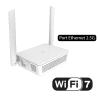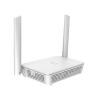-
€



The Huawei OptiXstar EG8145B7N-50 is a client terminal ONT designed for GPON networks. It features an SC/APC optical connector with a Class B+ laser, and the receiver sensitivity is -27 dBm. The terminal supports Wi-Fi 7 wireless transmission, using IEEE 802.11 b/g/n/ax/be protocols in the 2.4 GHz band and IEEE 802.11 a/n/ac/ax/be in the 5 GHz band. The maximum theoretical Wi-Fi throughput is 688 Mb/s in 2.4 GHz and 2882 Mb/s in 5 GHz. The terminal provides higher wireless network speeds compared to standard Wi-Fi 6 solutions with 2x2 MIMO.
The device is equipped with 1 2.5G Ethernet port (10/100/1000/2500 Mb/s) and 3 1G Ethernet ports (10/100/1000 Mb/s). The use of the 2.5G port allows for full utilization of the bandwidth offered by the GPON standard (2.5/1.25 Gb/s). Additionally, the terminal has 1 POTS port for connecting an analog phone and a USB 2.0 port. The manufacturer has used external omnidirectional antennas with a 5 dBi gain, providing better transmission range than devices with integrated antennas.

GPON ONT terminal
The offered product is designed to function as a client terminal ONT in GPON networks. It is equipped with an SC/APC optical port with a Class B+ laser. The receiver sensitivity is -27 dBm.
According to the GPON standard, the transmission bandwidth is 2.5 Gb/s for data download and 1.25 Gb/s for data upload.
Wi-Fi 7 BE3600
The device can transmit a Wi-Fi 7 network, supporting IEEE 802.11 b/g/n/ax/be protocols in the 2.4 GHz band and IEEE 802.11 a/n/ac/ax/be in the 5 GHz band. The maximum theoretical throughput is 688 Mb/s in 2.4 GHz and 2882 Mb/s in 5 GHz. This speed is sufficient for most subscribers, providing a high level of comfort when using internet resources.
Wi-Fi 7, in addition to features known from earlier generations, introduces two important innovations: Multi-RU and MLO. Multi-RU allows for the allocation of more than one resource unit (RU) to a single user, optimizing the network. This eliminates situations where a resource unit is not allocated to any user. MLO (Multi-Link Operation) enables devices to simultaneously transmit and receive data over multiple bands (in this case, 2.4 and 5 GHz). This significantly improves throughput compared to older Wi-Fi 6 / Wi-Fi 6E standards, where the client was connected to only one band at a time.


1x 2.5G Ethernet port, 3x 1G Ethernet port, 1x RJ11 port, 1x USB port
One of the key advantages of the EG8145B7N-50 is the inclusion of the 2.5G Ethernet port, which allows you to fully utilize the capabilities of GPON technology. Without changing the network infrastructure to XG-PON / XGS-PON, you can offer your subscribers packages with speeds over 1 Gb/s. The remaining three ports support the standard bandwidth of 1 Gb/s.
Additionally, the device is equipped with an RJ11 telephone port (POTS), which is useful if you offer VoIP services. The USB port enables users to, among other things, create a file server or share printers.
An ideal client device for GPON networks
With its modern Wi-Fi generation and the inclusion of a 2.5G Ethernet port, the EG8145B7N-50 is perfect as the main client terminal in your network. It allows you to offer subscribers triple play packages with internet speeds greater than 1 Gb/s. The device uses GPON technology, so you don't need to change your network infrastructure to stay a step ahead of the competition.

Specifications
| Huawei EG8145B7N-50 | |
| Device Parameters | |
|---|---|
| Dimensions (H x W x D) | 40 mm x 150 mm x 108 mm (without external antenna and pads) |
| Weight | About 282 g |
| Operating temperature | 0°C to 40°C |
| Operating humidity | 5% RH to 95% RH (noncondensing) |
| System power supply | 12 V DC, 1,5 A |
| Power adapter input | 100 - 240 V AC, 50/60Hz |
| Memory |
128 MB Flash 256 MB RAM |
| Static power consumption | 5 W |
| Maximum power consumption |
14 W |
| NNI (WAN) | GPON |
| UNI (LAN) | 1x 2.5GE, 3x GE, 1x POTS, 1x USB, Wi-Fi 7 |
| Optical connector | SC/APC |
| Indicators | Power / PON / LOS / LAN1 / LAN2 / LAN3 / 2.5GLAN / TEL / USB / WLAN / WPS |
| Interface Parameters | |
| GPON port | Class B+ Receiver sensitivity: -27 dBm Overload optical power: -8 dBm Wavelengths: US 1310 nm, DS 1490 nm Wavelength blocking filter (WBF) of G.984.5 Flexible mapping between GEM Port and TCONT GPON: consistent with the SN or password authentication defined in G.984.3 Bi-directional FEC SR-DBA and NSR-DBA |
| WLAN | IEEE 802.11 b/g/n/ax/be (2.4GHz) IEEE 802.11 a/n/ac/ax/be (5GHz) 2×2 MIMO (2.4GHz&5GHz) Antenna gain: 5 dBi Air interface rate: 688 Mbit/s (2.4GHz), 2882 Mbit/s (5GHz) 4096 QAM 160 MHz frequency bandwidth OFDMA MU-MIMO DCM BSS Coloring Beamforming Band steering WPA3 MLO (Multi-Link Operation) Multi-RU WMM/Multiple SSIDs/WPS |
| POTS port | Maximum ringer equivalence number (REN): 4 G.711A/μ, G.729a/b and G.722 encoding/decoding T.30/T.38/G.711 fax mode DTMF Emergency calls (with the SIP protocol) |
| USB port | USB2.0 FTP-based network storage File/Print sharing based on SAMBA DLNA function |
| Ethernet port | 1x2.5GE+3xGE Ethernet port-based VLAN tags and tag removal 1:1 VLAN, N:1 VLAN, or VLAN transparent transmission QinQ VLAN Limit on the number of learned MAC addresses MAC address learning GE port supports auto-adaptive 10 Mbit/s, 100 Mbit/s or 1000 Mbit/s 2.5GE port supports auto-adaptive 10 Mbit/s, 100 Mbit/s, 1000 Mbit/s or 2500 Mbit/s |
| Product Function | |
| Smart interconnection | Smart Wi-Fi coverage SIP/H.248 auto-negotiation Any port any service Parental control |
| Smart service | Scheduled Wi-Fi shutdown Smart Wi-Fi sharing: Portal/802.1x authentication; SoftGRE-based sharing |
| Smart O&M | IPTV video quality diagnosis Rogue ONT detection and isolation from the OLT Call emulation, and circuit test and loop-line test PPPoE/DHCP simulation testing Neighboring AP scanning |
| Layer 3 features | PPPoE/Static IP/DHCP NAT/NAPT Port forwarding ALG, UPnP DDNS/DNS server/DNS client IPv6/IPv4 dual stack, DS-Lite and IPv6 SPI Static/Default routes Multiple services on one WAN port |
| Multicast | IGMP v2/v3 snooping IGMP v2/v3 proxy MLD v1/v2 snooping |
| Security | SPI firewall Filtering based on MAC/IP/URL addresses Secure boot |
| Q&M | OMCI/Web UI/TR069 Variable-length OMCI messages Dual-system software backup and rollback |
| QoS | Ethernet port rate limitation 802.1p priority SP/WRR/SP+WRR Broadcast packet rate limitation |
| Home network feature | Visualized home network management User-defined bandwidth allocation Wi-Fi optimization & Wi-Fi roaming Wi-Fi O&M |






 Polski
Polski English
English Italiano
Italiano Español
Español Čeština
Čeština Српски
Српски Deutsch
Deutsch Ελληνικά
Ελληνικά Slovenský
Slovenský





